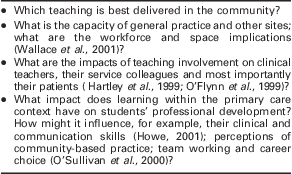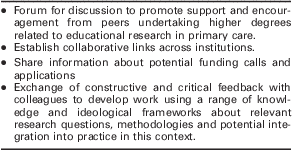A journey of a thousand miles begins with the first step
(Attributed to Lao Tzu circa
5th century BCE)
This month, we return to a key Hot Topic in the discipline of Academic Primary Care, namely recognising the essential role of Education and Teaching at the heart of excellence in primary care (Rosenthal et al., Reference Rosenthal, McKinley and Pearson2011).
Introduction
Two new groups within the Society of Academic Primary Care (SAPC) seek to respond to the challenges of providing high-quality collaborative research in primary care education. Here, we introduce the Special Interest Group in Educational Research (SIGER) along with the new Doctoral Student Network and consider their contribution to promoting the SAPC goal of research and teaching excellence within primary care in the United Kingdom.
Background – the importance of Primary Care Education Research
As health care has moved increasingly into the community, students have followed in large numbers, yet relatively little evidence is currently available about teaching in this context. A number of key research questions exist (see Table 1) in addition to more broad research opportunities to explore inter-professional community-based teaching including continuing professional development and postgraduate training for GPs, nurses and allied healthcare professionals. Evidence concerning all these issues could inform primary care policy and ensure that we achieve high quality, as well as high quantity of education and practice in years to come.
Table 1 Key research questions for Educational Research in Primary Care

Challenges to providing high-quality Primary Care Education Research
Educational Research in Primary Care has faced a number of internal and external challenges to date, including the scope and available time for research. Educational researchers have importantly often drawn upon a wealth of professional clinical and teaching expertise. They are, however, also faced with difficult tensions balancing demands for teaching, organisation and clinical service delivery, competing with dedicating energies towards research development. Projects have, therefore, tended to represent individual departmental achievements, rather than larger collaborative projects. Related educational researchers have had difficulty attracting major funders to provide protected research time (Cook et al., Reference Cook, Beckman and Bordage2007; Todres et al., Reference Todres, Stephenson and Jones2007). There are often considerable challenges in meeting the need frequently expressed by funding bodies to demonstrate direct relationships between education and patient outcomes. This often requires education to be conceptualised within a medical paradigm as an ‘intervention’ (Whitcomb, Reference Whitcomb2002), rather than using a more sociological perspective to explore the ‘work’ that education does.
Given the volume and range of health-care teaching and training now taking place in the community, and the likelihood that this will increase in the future, this area of enquiry clearly requires further development and support. SAPC has recognised this challenge and has supported the establishment of an Educational Research Special Interest Group (SIGER) and Doctoral Research Network within the Society.
Formation of new groups in response to these challenges:
Role of the SIGER
The SAPC supports a number of special interest groups (SIGs) (SAPC, 2011), enabling members from a spectrum of disciplines and experience to come together to develop new relationships and collaborations supporting teaching and research agendas. Bringing together education and research experience has the potential to both maximise the use of innovative and suitable research methods to create and address challenging research questions, as well as inform research with existing experience. This might include promoting user involvement, relevance and utility as part of the research process; developing new and exciting methodologies to explore questions about complex learning processes within this context; and considering the translational gap throughout the research process, maximising the integration of relevant research findings to enrich community-based teaching delivery and practice.
The SIGER comprises both medical and non-medical members interested in researching education in the primary care setting. Its aims are to:
• Provide a means for sharing ideas and innovations related to primary care clinical education.
• Encourage and facilitate the conducting of high-quality research in areas related to clinical education.
• Support the dissemination and implementation of clinical education research findings.
• Maintain liaison with other organisations with similar interests in clinical education or educational research.
• Support the training and education of educational researchers within SAPC (Rosenthal and McKinley, Reference Rosenthal and McKinley2011).
By pursuing these aims, members will be better positioned to form a substantial contribution to SAPC conference presentations, attract major external long-term funding and produce high-quality research to publish in a range of specialist and high-impact publications.
Role of the Doctoral Student Network
One of the recent initiatives of the SIGER has been to start developing a doctoral student network (see Table 2). This is currently a small group of SAPC members who are either considering, currently undertaking or have recently completed doctoral research in clinical education related to primary care. We are keen to expand this group, learn from each other and develop the agenda for research and expertise in this area. This includes strengthening links both with existing primary care researchers and with wider communities of educational researchers, such as the Research for Clinical Learning & Practice Network and Association for the Study of Medical Education collaboration.
Table 2 Purpose of the Doctoral Student Network

How can I participate?
For further information about the SIGER, please visit: http://www.sapc.ac.uk/index.php/special-interest-groups/education-research
For more information about the doctoral student network, please contact sophie.park@ucl.ac.uk or alexander.harding@pms.ac.uk
Conclusion
The SIGER provides a further example of the SAPC's work to enhance primary care through academic excellence, promoting educational research as central to scholarship within Primary Care. It enhances existing links with academic primary care researchers, clinicians and teachers, as well as fostering fertile links with wider communities of practice in educational research.




